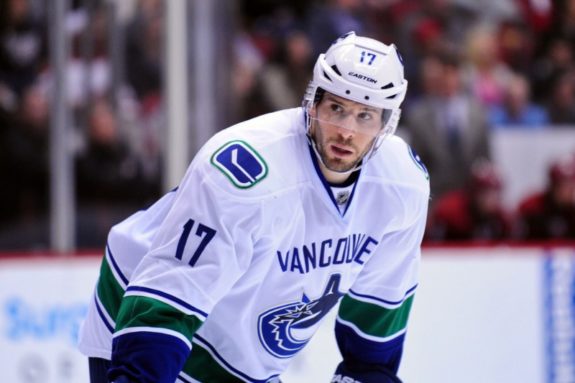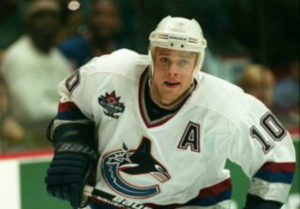With the Vancouver Canucks in the basement of the Western Conference and looking to be sellers at the trade deadline, fans will soon be turning their heads towards the NHL Draft. The fact is, it’s likely that the Canucks will be picking high for the third consecutive season (and fourth in the past five).
The year they picked later in the first round, management snagged Brock Boeser with the 23rd overall selection in the 2015 draft. You won’t find many Vancouverites upset with that choice, especially after his MVP showing at the 47th NHL All-Star game but it took nearly 30 years for the Canucks to develop a homegrown talent as talented as Boeser.
The Mike Gillis Era
To put into perspective how awful the Canucks have been at drafting, you don’t have to look far. During the Mike Gillis era, the Canucks were one of the best teams in the league but also one of the worst at developing their own talent.

In the years between 2006 and 2011, the organization’s draft picks played a total of 239 games. Consider that 36 of those draft picks, including five first-rounders, only logged 71 combined points. Numbers like that make it tough for the team to succeed long-term.
Now, with Boeser dominating, Elias Pettersson on the way and another lottery pick coming in hot, let’s look at the top ten draft choices in Canucks history. Hopefully, a decade from now this list will look vastly different.
Numbers and rankings are based solely on their performance with the Canucks.
The Energy Guys:
10) Matt Cooke – Canucks 6th round pick, 144th overall in 1997
Career Canuck numbers: 566 games, 83 goals, 203 points, 8 short-handed goals
Matt Cooke cracks the top 10 in large part because of his role as a grinder and penalty killer. Never afraid of anyone, Cooke was a staple in the bottom-six during the ‘West Coast Express’ era. He was also the player who infamously scored the last second goal against the Calgary Flames in the first round of the 2004 playoffs when Ed Jovanovski was jumping up and down in the penalty box.
In total, Cooke recorded five double-digit goal seasons with the Canucks and over 30 points on three different occasions. He went on to play 1,046 games and finished two points shy of 400 for his career.
https://www.youtube.com/watch?v=hFXSw6wqNdI
9) Kevin Bieksa – Canucks 5th round pick, 151st overall in 2001
Career Canuck numbers: 597 games, 56 goals, 241 points, 84 power play points
Kevin Bieksa comes in at number nine as one of the most beloved Canucks in the last twenty years. Drafted as a 20-year-old out of Bowling Green, Bieksa didn’t crack the Canucks lineup until he was 24. He broke the 40-point barrier as a d-man three times and wasn’t afraid to be a bruiser and stick up for teammates whenever the situation arose.
He ended his tenure ranked sixth in franchise history for points by a defenceman with 241. It’s easy to forget that when Henrik Sedin was gunning for the Art Ross Trophy in 2010, in the last game of the season Head Coach Alain Vigneault wanted Bieksa out there at all times to run the show from the back end. As a result, Henrik put up four points, Daniel registered a hat-trick, and the rest is history.
8) Ryan Kesler – Canucks 1st round pick, 23rd overall in 2003
Career Canuck Numbers: 655 games, 182 goals, 393 points, 61 power play goals
In 2003, the Canucks selected Kesler with the 23rd selection. In 2006, when Kesler was still developing, the Philadelphia Flyers extended an offer sheet for him worth $1.9 million. Boy, would it have been a mistake to let him go. For half a decade, Kesler was arguably the best 2nd line centre in the game and best two-way player.

Kesler singlehandedly beat the Nashville Predators in the second round of the 2011 playoffs and won the Frank J. Selke Trophy that year as the NHL’s best defensive forward. He is one of ten Canucks to score 40 plus goals in a season and cracked the 70-point plateau on two occasions. If he had left the Canucks on better terms, or never left at all, he would likely be much higher on this list.
The Swedes:
7) Alex Edler – Canucks 3rd round pick, 91st overall in 2004
Career Canuck numbers: 725 games, 80 goals, 317 points, 144 power play points (still active)
With Cory Schneider, Edler, and Jannik Hansen coming out of the 2004 draft, you could make a valid case that this is the Canucks’ best drafting year in the past 30 years. Edler has been a stalwart on the backend for the ‘Nucks over the last decade and is ranked fourth all-time in scoring by a Canucks defenceman with 317 points. He has led the team in ice-time in seven of the past eight seasons, cracked 30 points five times, and has been terrific on special teams.
Over the past couple of years, he and Chris Tanev have been one of the most underrated defensive duos in the game when it comes to shutting down the opposition. Edler may be slowing down as age and injuries are catching up to him, but any time you can get over 700 games and 300 points from a defenceman selected in the 3rd round (out of a Swedish Men’s League), you’ve done well.

6) Mattias Ohlund – Canucks 1st round pick, 13th overall in 1994
Career Canuck numbers: 770 games, 93 goals, 325 points, 139 power play points
The Canucks nearly lost Ohlund to the Toronto Maple Leafs before he even played a game with the team, when he signed a five-year offer sheet extended by the Leafs. However, the Canucks matched the offer and once Ohlund was in the lineup, he was rarely out of it.
He was dominant as a two-way defender for 11 seasons. As a massive body with a hard shot and great sense of the game, Ohlund constantly led the team in ice-time while consistently shutting down the opponent’s top line. In total, Ohlund recorded 93 goals and 325 points as a Canuck, both franchise records among defensemen.
The Top Five:
5) Stan Smyl – Canucks 3rd round pick, 40th overall in 1978
Career Canuck numbers: 896 games, 262 goals, 673 points, 181 power play points
“The Steamer” was a fan favourite and captain of the Canucks for eight seasons. One of the smaller players of that generation, the 5’8”, 185 lb freight train was not afraid to throw the body around and stand up to anyone who was willing to toss ’em. Smyl was an integral part of the franchise from the moment he stepped onto the scene, until the end when injuries derailed his magnificent career.
He played a crucial role in leading the Canucks to their first Stanley Cup Final appearance in 1982, when he was named captain mid-season after Kevin McCarthy broke his ankle in practice. A year later, at the age of 25, he had a career year with 88 points. He was a point-per-game player twice in his career and registered over 30 goals on three separate occasions.
When Smyl retired, he was the franchise’s all-time leader in games, goals, assists, and points. It is safe to say, he was the first Canuck to dominate the record books and the first to have his number (12) retired.
4) Pavel Bure – Canucks 6th round pick, 113th overall in 1989
Career Canuck numbers: 428 games, 254 goals, 478 points, 24 short-handed goals
It is tough to name a player who could take over a game as well as Pavel Bure.

Amazingly, he was drafted in the 6th round because of the ‘Russian Factor’ of the time, and Bure came over to the NHL in 1991 where he made a name for himself. As the only Canuck (so far) to win the Calder Trophy as the league’s rookie of the year, Bure is far and away the most talented player the Canucks have ever drafted.
Add the two 60-goal seasons and 31 points during the 1994 Cup run to the countless highlight-reel goals he recorded and it’s easy to see why Bure is the fourth best Canucks draft pick of all-time.
3) Trevor Linden – Canucks 1st round pick, 2nd overall in 1988
Career Canuck numbers: 1140 games, 318 goals, 733 points, 231 power play points
The face of the franchise from the moment he put on the jersey on draft day in 1988, Linden is still with the organization today. He is everywhere in Canucks history, as he is in the top 10 in nearly every statistical category. He was also the captain during the infamous 1994 Stanley Cup run that ended in devastation against the New York Rangers. Linden cracked the 70-point barrier four times with the franchise and played a strong two-way game.
Although Linden was shipped out of town in 1998, which was not looked on well by fans, a few notable players that joined the organization were Todd Bertuzzi, Bryan McCabe, and the pick that landed Jarkko Ruutu. Even though it was a tough pill to swallow at the time, it is tough to imagine where the team would have been without Bertuzzi and McCabe, who was eventually traded by Brian Burke in the 1999 draft day deal that helped acquire one of the two guys who are at the top of this list. After Linden returned in 2002, he bolstered his stats and now ranked third or fourth in virtually every offensive statistic.
The Twins

2 & 1 ) Daniel and Henrik Sedin – Canucks 1st round picks, 2nd and 3rd overall in 1999
Career Canuck numbers: Daniel – 1273 games, 381 goals, 1016 points
Henrik – 1297 games, 239 goals, 1052 points (both still active)
You have to give Brian Burke credit; he did his homework and pulled every string he could to land the two best players from the 1999 draft class. Sure, it took half a dozen years for the twins to get on their feet in the NHL but the Swedes have been far and away the best draft picks in Canucks history.
Number one and two in nearly every statistical category in the franchise’s lore, they have each won a handful of league awards, including the Art Ross and a couple of MVP awards (Henrik won the Hart, Daniel won the Ted Lindsay). For all they do on the ice, the twins have also been amazing contributors to the community. With Daniel and Henrik riding into the sunset of their magnificent careers, it is exciting to watch them mentor the next chapter of Canucks prospects in the process.
Honourable mentions (in no particular order) with career numbers:
Brock Boeser: 55 games, 28 goals, 48 points (tempting, but definitely too soon)
Bo Horvat: 261 games, 59 goals, 139 points, 29 power play points (still active)
Mason Raymond: 374 games, 80 goals, 178 points, 47 power play points
Jannik Hansen: 565 games, 105 goals, 235 points, 633 hits
Cory Schneider – 55-26-8 record, 2.20 GAA, .927 save percentage, 9 shutouts